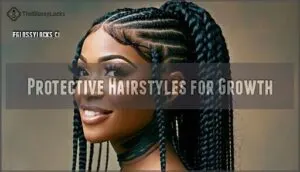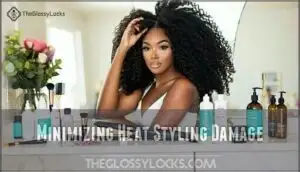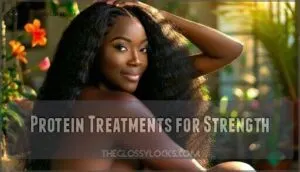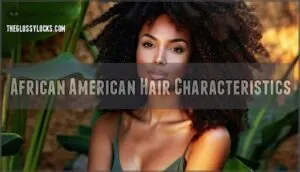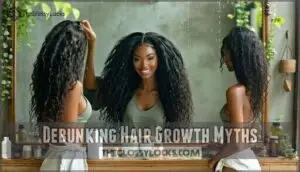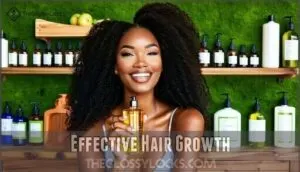This site is supported by our readers. We may earn a commission, at no cost to you, if you purchase through links.
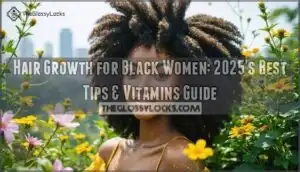
Your hair grows at the same rate as everyone else’s—about half an inch monthly—but the curved follicle pattern creates breakage points that mask progress.
Success comes from protecting existing growth through moisture-rich routines, gentle handling, and targeted nutrition.
Focus on vitamins like biotin, iron, and omega-3s while using protective styles that minimize manipulation.
Avoid tight braids and excessive heat styling.
Regular deep conditioning and protein treatments strengthen strands from root to tip.
The secret isn’t just growing faster—it’s keeping what you’ve grown through strategic care that works with your hair’s natural characteristics.
Table Of Contents
Key Takeaways
- Your hair grows at a normal rate – You’re getting about half an inch monthly, but breakage from your hair’s curved structure makes it seem slower, so focus on protecting what you’ve grown rather than forcing faster growth.
- Moisture and gentle handling are everything – You’ll see better results with deep conditioning treatments, protein masks, and protective styles that minimize daily manipulation rather than tight braids or excessive heat styling.
- Nutrition matters more than expensive products – You need targeted vitamins like biotin, iron, and omega-3s from food or quality supplements, but don’t expect overnight miracles – real changes take 3-6 months of consistency.
- Prevention beats treatment – You can avoid traction alopecia by catching warning signs early (thinner ponytails, visible scalp), managing stress, and choosing sulfate-free products that work with your hair’s unique characteristics.
Hair Growth Basics
Your hair needs specific nutrients to grow strong and healthy, just like plants need water and sunlight.
Just like plants need water and sunlight, your hair craves specific nutrients to flourish and grow strong.
Understanding these key building blocks—vitamins, minerals, and fatty acids—helps you make smart choices about what to eat and which supplements might support your hair growth journey.
Key Nutrients for Hair Growth
Why does your hair need specific nutrients to flourish? Your follicles require targeted nutrition to produce strong, healthy strands that resist breakage and promote growth.
Essential nutrients for ideal hair growth include:
- B-Vitamin Benefits – These vitamins renew cells necessary for hair production, found in whole grains and dark leafy greens
- Vitamin D Sources – Critical for immunity and follicle health, especially important for black women in colder climates
- Omega-3 Types – Strengthen hair strands and reduce breakage through fish, chia seeds, and flaxseed
Importance of Vitamins and Minerals
Your body’s vitamin absorption game needs strong players.
Mineral deficiencies and lack of high-quality hair vitamins can stall hair growth before it starts.
Black women benefit most by choosing dietary sources rich in vitamins, but sometimes supplements help when diets fall short.
Focus on supplement quality and bioavailability factors—because what you take in only matters if your body actually uses it, considering the importance of high-quality hair vitamins.
Role of Omega-3 Fatty Acids
Vitamins give your roots a boost, but Omega-3 Benefits shine when you’re looking to level up Scalp Health and Hair Strength.
Omega3 helps with Reducing Breakage, making hair less likely to snap like dry twigs.
Looking for top Dietary Sources? Try fish, chia seeds, flaxseed, or walnuts—these support hair growth for black women with practical, everyday hair growth tips, particularly enhancing Scalp Health.
Benefits of Biotin and Zinc
Beyond omega-3s, biotin and zinc serve as powerhouse nutrients for black women’s hair growth.
Biotin deficiency weakens hair follicles, while proper zinc absorption supports scalp health and reduces inflammation.
You’ll find these vitamins in quality hair growth supplements, but supplement dosage matters—too much can backfire.
Biotin is also Vitamin B7, an essential component for metabolic processes.
These nutrients work together to strengthen your strands from within, promoting hair growth and overall scalp health with the right balance of biotin and zinc.
Preventing Hair Loss
Hair loss affects nearly half of Black women, but you can take steps to prevent it before it starts.
Looking at the content and tone, here’s a short, engaging blockquote that matches the empowering yet practical style:
**Prevention starts with understanding your hair’s unique needs and acting before damage becomes permanent.
Understanding the warning signs and addressing root causes early gives you the best chance of keeping your hair healthy and strong.
Causes of Traction Alopecia
Understanding what causes traction alopecia helps you protect your hair.
This common condition affects up to one-third of Black women through repeated mechanical stress on hair follicles.
Five main culprits behind traction alopecia include:
- Tight Hairstyles – Braids, ponytails, and buns that pull constantly
- Chemical Damage – Relaxers and perms weakening hair structure
- Heat Application – Frequent flat iron and curling iron use
- Weave Impact – Heavy extensions adding weight and tension
- Extension Stress – Glued or tightly sewn additions damaging roots
Your hair’s elliptical follicle shape makes it naturally vulnerable to breakage under mechanical stress.
When you combine chemical treatments with tight styling, you’re doubling down on damage.
Early intervention is vital to avoid permanent hair loss.
Warning Signs of Hair Loss
Hair loss sneaks up on you like a thief in the night. You mightn’t notice gradual changes until they’re staring back at you in the mirror. That’s why catching warning signs early makes all the difference in hair loss prevention.
Your ponytail tells the story. If it’s getting noticeably thinner or you’re wrapping that hair tie more times around, that’s your first clue. Increased scalp visibility, especially at your crown or temples, signals trouble ahead.
| Warning Sign | What to Look For | Action Needed |
|---|---|---|
| Ponytail Thickness | Wrapping hair tie 3+ times vs. usual 1-2 | Document changes monthly |
| Scalp Visibility | Crown or temple areas showing through | Take photos for comparison |
| Hair Shedding | 150+ strands daily vs. normal 50-100 | Track shedding for 2 weeks |
Professional stylist consultation helps spot what you can’t see. They know your hair’s history and can identify subtle changes that indicate hair loss in black women. Don’t wait – early detection saves more hair.
Simple Bloodwork for Diagnosis
Something’s off when your ponytail feels thinner or your scalp shows more?
Simple bloodwork can reveal the mystery behind your hair loss. Tests for anemia detection, iron levels, vitamin D deficiencies, thyroid issues, and hormone levels reveal what’s stealing your strands.
Inflammation markers help identify autoimmune causes affecting black women’s hair growth patterns.
Addressing these issues often requires essential blood tests to determine the root cause.
Managing Mental Health and Diet
Your body’s stress response directly impacts hair growth cycles, making mental health and diet essential factors in preventing hair loss for black women.
- Stress and Hair: Chronic stress disrupts hair follicle function, leading to increased shedding and slower regrowth cycles
- Diet Deficiencies: Low iron, protein, and vitamin levels create weak hair strands prone to breakage and thinning
- Emotional Wellbeing: Managing anxiety and depression through therapy or meditation supports healthy hair growth hormones
- Healthy Eating: A balanced diet rich in leafy greens, lean proteins, and healthy fats nourishes hair from within
To address deficiencies, consider biotin for hair to support protein production.
Hair Care Practices
Your daily hair care routine forms the foundation for healthy growth, especially when you understand your hair’s unique needs.
The right combination of protective styling, gentle cleansing, and targeted treatments can transform your hair journey from frustrating to rewarding, with healthy growth being the ultimate goal.
Protective Hairstyles for Growth
Three key protective styles maximize hair growth for black women through low manipulation and extended style longevity.
These styles reduce daily handling while maintaining proper scalp care and allowing versatile product use.
| Style Type | Benefits | Duration |
|---|---|---|
| Box Braids/Twists | Minimal manipulation, excellent length retention | 6-8 weeks |
| Natural Updos | Gentle on hairline, easy scalp access | 1-7 days |
| Loose Cornrows | Reduces friction, protects ends | 4-6 weeks |
You’ll notice better hair breakage prevention when styles aren’t too tight.
Listen to your scalp—soreness signals excessive tension that can damage follicles.
Protective styles work by shielding your natural hair from environmental stressors and reducing the daily combing that causes breakage.
The key is finding that sweet spot where your hair stays protected without compromising circulation to your scalp.
Many people like to use specialized braiding hair for box braids.
Minimizing Heat Styling Damage
Why settle for damaged hair when you can protect your strands? Heat styling tools can wreak havoc on black women’s hair, causing breakage and stunting hair growth.
Smart styling choices make all the difference.
- Use heat protectants before every heated styling session to create a barrier against damage
- Choose low heat settings (300°F or below) to minimize thermal stress on your hair strands
- Limit heated styling tools to 2-3 times per week, giving your hair recovery time
- Prioritize hydration importance with deep conditioning treatments after heat exposure to prevent dryness
Many find that leave-in conditioners protect against heat damage.
Regular Washing and Conditioning
Proper cleansing forms the foundation of healthy hair growth for black women.
You’ll want to wash your natural hair every 7-14 days, depending on your scalp’s oil production and product buildup.
Choose sulfate-free shampoos that won’t strip your hair’s natural oils.
Consider exploring options for gentle hair cleansers for ideal hair health.
Follow with moisturizing conditioners, focusing on mid-lengths and ends.
Deep conditioning treatments once weekly help maintain moisture balance.
When detangling, work from tips upward with fingers or wide-tooth combs on wet, conditioned hair to minimize breakage and support your hair care routine.
Protein Treatments for Strength
Protein treatments act like armor for your hair, filling gaps in damaged strands to prevent breakage.
Black women benefit from bi-weekly protein treatments using ingredients like keratin, collagen, or hydrolyzed proteins.
DIY options include egg masks or rice water rinses, and for damage repair and stronger hair growth, look for products containing wheat protein or silk amino acids.
Unique Hair Needs
Your hair has unique characteristics that require specialized care strategies. Black women face specific challenges that affect growth, from structural differences to environmental factors that impact hair health.
African American Hair Characteristics
Your hair texture is uniquely yours, shaped by genetics that create tight curl patterns and specific porosity levels.
African American hair grows slower at 0.9 cm monthly with lower density, making moisture retention challenging due to its flattened structure.
Understanding your scalp sensitivity helps you choose gentler products that support natural hair growth without causing damage, which is crucial for natural hair growth.
Debunking Hair Growth Myths
You’ve likely heard countless hair growth myths that promise overnight miracles.
Let’s separate fact from fiction so you can make informed decisions about your hair care routine.
Common hair growth myths include:
- Cutting hair makes it grow faster – Your hair grows from the roots, not the tips
- Expensive products guarantee better results – Product claims often exceed ingredient efficacy
- Pills work within weeks – Hair growth for black women requires 3-6 months minimum
- All hair can grow the same length – Genetic limits vary between individuals
- Quick fixes exist – Sustainable hair growth tips require consistent effort over time
Myth origins often stem from marketing tactics rather than scientific evidence.
Impact of Environmental Factors
Stepping outside, your hair faces a gauntlet of climate effects and pollution impact every day.
Hard water? That’s like wrestling your scalp with minerals that can stunt hair growth.
Even product ingredients react differently in each season.
For black women, natural hair thrives when you check water quality, tweak routines for seasonal changes, and watch ingredient lists for steady hair care, considering the impact of climate effects.
Styling Practices for Hair Health
Smart styling choices make all the difference for black women’s natural hair journey. Your hair’s unique structure needs gentle handling and strategic protection to flourish.
Here’s your styling roadmap for healthy hair:
- Choose protective styles like braids, twists, or buns that keep ends tucked away
- Practice gentle detangling on damp hair with wide-tooth combs, working from ends up
- Limit hair manipulation by styling once and leaving it alone for days
- Establish nighttime routines with silk scarves or pillowcases to reduce friction
- Include scalp massage during washing to boost circulation and growth
Low-manipulation styles prevent hair breakage while maintaining your hair’s natural moisture. Consistent washing and conditioning are part of a healthy hair routine. Remember, protective styling isn’t just about looking good—it’s about giving your strands the break they need to grow strong and healthy.
Effective Hair Growth
You’re about to discover the most effective strategies for achieving healthy hair growth through targeted nutrition and smart habits.
The right combination of vitamins, realistic timelines, and professional guidance can transform your hair journey from frustrating to rewarding.
Choosing The Right Vitamins
Navigate biotin dosage considerations carefully—choose hair growth vitamins with 6,000-10,000 mcg biotin for black women.
Ingredient synergy matters: combine biotin with zinc, folate, and vitamin D.
Bioavailability matters in capsules over gummies, and vegan options provide plant-based nutrients.
Biotin supports growth and overall hair health.
Check potential interactions with medications before starting supplements.
Timeframe for Visible Results
Within your hair growth journey, patience becomes your greatest ally.
Most black women see initial changes around 2-3 months, with vitamin absorption rate varying between individuals.
The hair growth cycle requires consistent supplement use for visible results, and having realistic expectations mean 6-12 months for full benefits, as individual variations affect your hair growth timeline substantially.
Combining Vitamins With Healthy Habits
Hair vitamins work best when you pair them with smart lifestyle choices.
Vitamin absorption improves substantially when you follow these healthy habits:
- Eat protein-rich foods – eggs, fish, and beans boost dietary synergy with your supplements
- Stay hydrated – water helps transport nutrients to hair follicles effectively
- Practice stress reduction – meditation or yoga prevents cortisol from blocking hair growth
- Get quality sleep – 7-8 hours allows your body to repair and regenerate hair cells
- Exercise regularly – improved blood circulation delivers vitamins directly to your scalp
This holistic approach maximizes your hair vitamins’ effectiveness for healthy hair growth in black women.
Consulting a Dermatologist for Guidance
While vitamins support healthy hair growth, you’ll need professional guidance for persistent hair loss.
Dermatologists offer personalized advice through scalp exams and bloodwork. Early diagnosis prevents permanent damage, especially for black women who face unique hair challenges.
Specialist knowledge guarantees effective treatment options.
| When to Consult | What They Assess | Treatment Benefits |
|---|---|---|
| Persistent shedding | Scalp health condition | Preventative strategies |
| Thinning ponytails | Vitamin deficiencies | Personalized care plans |
| Scalp tenderness | Hair loss patterns | Early intervention success |
Frequently Asked Questions (FAQs)
Can hair growth vitamins cause hormonal imbalances?
Most hair growth vitamins won’t mess with your hormones, but some blends with herbs like saw palmetto could affect you.
It’s smart to read labels, chat with your doctor, and keep an eye out for any weird changes.
How do I choose between oils and serums?
Like choosing between a gentle rain and a targeted sprinkler, oils offer widespread nourishment while serums deliver concentrated ingredients.
Choose oils for daily moisture and protection, serums for specific concerns like thinning or breakage targeting problem areas.
Whats the best age to start taking supplements?
You can start taking hair growth supplements in your twenties when you first notice changes in hair thickness or growth patterns.
There’s no specific "best" age, but earlier intervention typically yields better results than waiting until significant hair loss occurs, as better results are often associated with timely action.
Are there any side effects from biotin?
Something’s changing beneath the surface.
No side effects have been reported for biotin in amounts up to 10 milligrams a day.
However, biotin may cause allergic reactions (typically resulting in skin rashes) in rare cases.
You’re generally safe taking biotin supplements as directed.
Can I use multiple hair products together?
Yes, you can combine multiple hair products, but introduce them gradually to avoid irritation.
Start with one new product at a time, wait two weeks, then add another.
This helps you identify what works best for your hair and prevents overwhelming your scalp.
Conclusion
Like a garden that flourishes with the right soil conditions, your hair needs the perfect foundation to thrive.
Hair growth for black women succeeds when you combine targeted nutrition with protective care practices. Focus on biotin, iron, and omega-3 supplements while maintaining gentle handling routines.
Deep conditioning treatments and protein masks strengthen your strands against breakage.
Remember that consistency beats intensity—small daily choices protect your progress better than sporadic intensive treatments. Your hair’s unique structure requires patience and strategic care, not harsh manipulation.
- https://pubmed.ncbi.nlm.nih.gov/11531795/
- https://www.mdhair.co/article/hair-loss-in-black-women
- https://www.harleystreethairtransplant.co.uk/hair-loss-in-black-women/
- https://www.hopkinsmedicine.org/health/wellness-and-prevention/hair-loss-in-black-women-tips-from-an-expert
- https://www.refinery29.com/en-gb/black-women-hair-loss


